|
|
|
Sort Order |
|
|
|
Items / Page
|
|
|
|
|
|
|
| Srl | Item |
| 1 |
ID:
093889
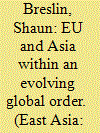

|
|
|
|
|
| Publication |
2010.
|
| Summary/Abstract |
The papers in this special edition are a very small selection from those presented at the EU-NESCA (Network of European Studies Centres in Asia) conference on "the EU and East Asia within an Evolving Global Order: Ideas, Actors and Processes" in November 2008 in Brussels. The conference was the culmination of three years of research activity involving workshops and conferences bringing together scholars from both regions primarily to discuss relations between Europe and Asia, perceptions of Europe in Asia, and the relationship between the European regional project and emerging regional forms in Asia. But although this was the last of the three major conferences organised by the consortium, it in many ways represented a starting point rather than the end; an opportunity to reflect on the conclusions of the first phase of collaboration and point towards new and continuing research agendas for the future.
|
|
|
|
|
|
|
|
|
|
|
|
|
|
|
|
| 2 |
ID:
093893
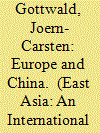

|
|
|
|
|
| Publication |
2010.
|
| Summary/Abstract |
Relations between the People's Republic of China and the European Union have matured significantly. While the European Commission is actively promoting an EU China policy, the influence of the member states continues to be a defining element. In this regard, most studies and political comments call for greater coherence in European China policies. Looking at recent debates and programmes in five member states, the paper identifies three trends: programmatic convergence, the politicisation of bilateral relations within member states and an increasing assertiveness towards the PRC.
|
|
|
|
|
|
|
|
|
|
|
|
|
|
|
|
| 3 |
ID:
093892
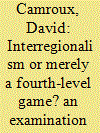

|
|
|
|
|
| Publication |
2010.
|
| Summary/Abstract |
It is argued in this paper that the normative nature of both the conscious and unconscious attempts of the European Union as a 'civilian power' to export its model of regional integration elsewhere, has led to the claim that an ostensibly new form of interaction in international relations - one characterized as interregionalism - has emerged. An examination of the EU-ASEAN relationship, however, would suggest that this assertion is greatly exaggerated. Between conventional bilateral relations, between individual EU members and individual Southeast Asian nations, and forms of multilateral and asymmetrical bilateral relations between the EU as a global actor and individual ASEAN members, the space for interregionalism is indeed very limited. Rather, by building on Putnam's seminal work enunciating his metaphor of "two-level games" (i.e. the domestic and the international) and its extension in Patterson's and Deutsch's discussion of 'three level games' (the third level being the intra-regional), it is suggested that interregionalism is merely the addition of a minor fourth level in international relations bargaining. Such a characterization has the salutary effect of drawing attention back, both to the different forms of regional integration, and to the varying capacities within regional entities. It is these elements that are worthy of further research, rather than some imagined alchemy denoted as interregionalism. The latter can best be described as a normative milieu goal, rather than being an appropriate and useful analytical category.
|
|
|
|
|
|
|
|
|
|
|
|
|
|
|
|
| 4 |
ID:
093890
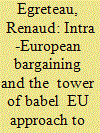

|
|
|
|
|
| Publication |
2010.
|
| Summary/Abstract |
Since the 1990 imposition of an arms embargo, the European Union has kept on furthering its sanction policies towards Burma's military regime in response to its poor record on human rights and authoritarian rule over the country. However, more than a decade after the 1996 EU Common Position on Burma, the European approach to the Burmese conundrum has still failed to achieve its initial objective of facilitating a transition to democracy and of stimulating aid and development in the country. This article seeks to underline the limits of the EU position by highlighting the internal and external obstacles the Europeans have been facing in their policymaking process towards Burma. It is argued that the varied and multiple interests of the 27 EU members; an influential European public opinion favouring an attitude of ostracism; and misunderstandings or miscalculations in appreciating the current state of Burmese affairs have hindered the EU from playing an efficacious role. Moreover these factors also impede its reappraisal.
|
|
|
|
|
|
|
|
|
|
|
|
|
|
|
|
| 5 |
ID:
093891
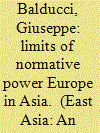

|
|
|
|
|
| Publication |
2010.
|
| Summary/Abstract |
In recent years an increasing number of works on EU international actorness have begun to focus on notions of "normative, value-driven external policy". However, the majority of these works tend to uncritically analyse EU foreign policy without considering its internal complexity and the existing national, supranational and intergovernmental dynamics. This paper first sheds light on these issues by proposing an original theoretical and analytical framework to study European, rather than merely EU, normative foreign policy. Secondly, this paper attempts to empirically apply such a framework in the specific case of European human rights promotion in China. What emerges is that in the case of China, and Asia more broadly, Europe appears more as a normative trap, where the interaction of EU institutions and member states originate policies not in line with the EU human rights normative basis.
|
|
|
|
|
|
|
|
|
|
|
|
|
|
|
|
| 6 |
ID:
093894
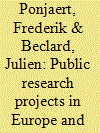

|
|
|
|
|
| Publication |
2010.
|
| Summary/Abstract |
The projects discussed in this paper, Galileo and ITER, are two contrasting experiences of Euro-Asian cooperation within Very Large (Public) Scientific Enterprises. They offer key insights into the deepening relations which have given shape to the rapidly expanding field of Euro-Asian collaborative interregional projects. Cooperative agendas within such "Big Science" endeavors heighten the question of the political considerations supporting the decision to engage specific forms of international cooperation. As the main driving force behind both projects, the EU's choices have resulted in the establishment of novel and distinct forms of Euro-Asian scientific cooperation. A better understanding of how such Euro-Asian initiatives emerge can logically be garnered by confronting the Euro-Chinese cooperation within Galileo, and the Euro-Japanese partnership within ITER. This comparison will show that the agendas and institutions of these two interregional policies vary greatly. Within the same policy field - in casu Large Scientific Projects - and in relationship to the same region - i.e. East Asia - this study shows that fundamentally different policies are practiced side-by-side. If in both cases Euro-Asian scientific cooperation has provided its participants with renewed leverage and unprecedented opportunities, the exact scope and function of these interregional collaborations range from the merely tactical in the Euro-Chinese Galileo experience, to the substantial in the Euro-Japanese ITER experience.
|
|
|
|
|
|
|
|
|
|
|
|
|
|
|
|
|
|
|
|
|